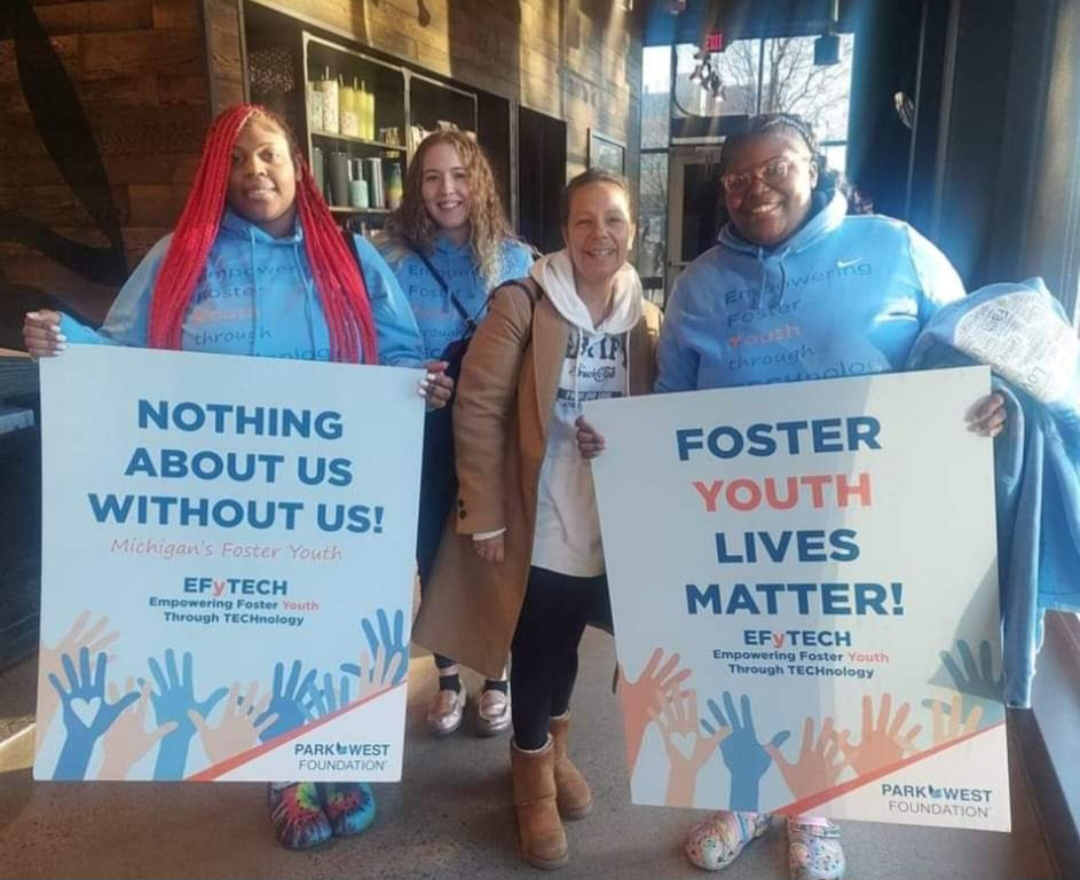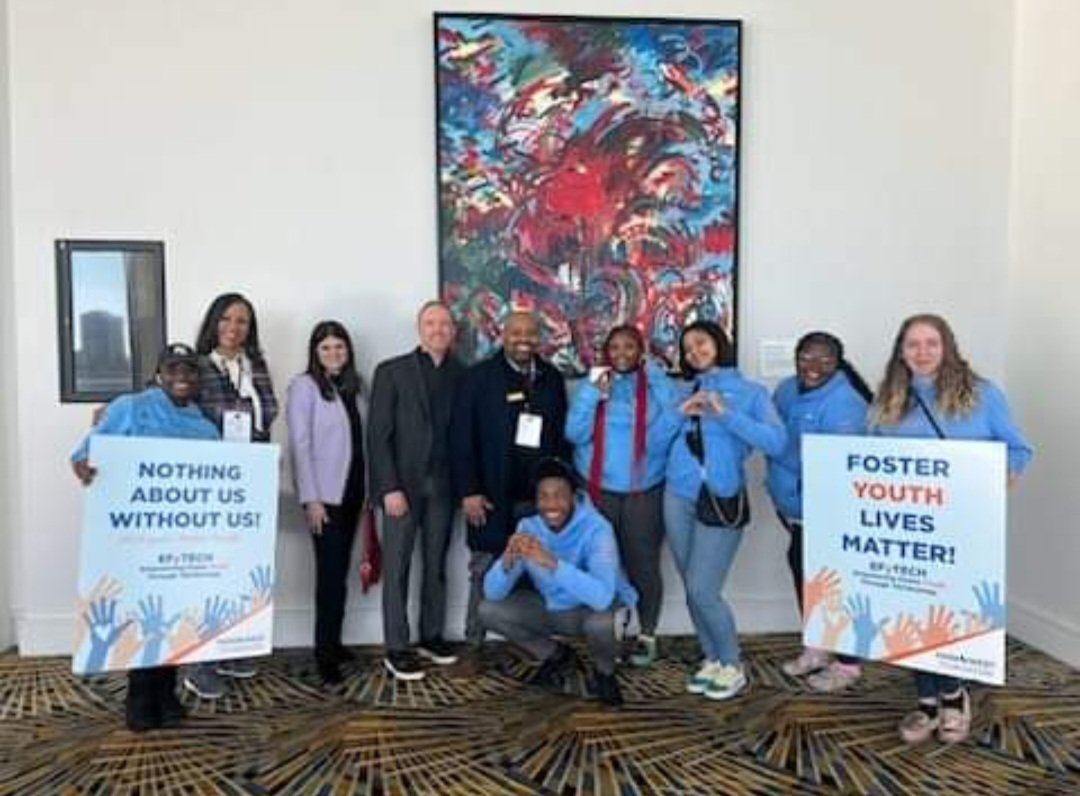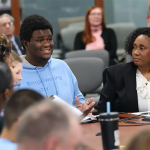Park West Foundation – Empowering Foster Youth Through TECHnology (EFyTECH) Policy Priorities 2024
On February 25, 2022, the first of six foster youth-led convening was facilitated by foster youth advocates of Park West Foundation – Empowering Foster Youth Through TECHnology (EFyTECH), to improve educational outcomes for students in foster care. The convenings were held in collaboration with several stakeholders including MDE, MDHHS & the State Board of Education, gaining unexpected coverage by several local and national media networks.

In addition, EFyTECH youth facilitated two focus groups of students in foster care 18-20 and participated in several working meetings with MDE, MDHHS including, Superintendent Michael Rice and Kyle Guerrant of MDE, Director Demetrius Starling and Rachel Willis of MDHHS and Tiffany Tilley, State Co-Vice President of the Michigan State Board of Education.
This foster youth-led effort resulted in policy recommendations of July 2022, designed to improve educational outcomes and graduation rates for students in foster care, which were amplified in the Michigan State Board of Education Resolution of December 13, 2022. The resolution, which was developed with impute by EFyTECH youth with lived expertise of foster care, MDE, and MDHHS, was also adopted by Congresswoman Haley Stevens and District 11, followed by the Democratic Party Convention on February 11, 2023.
In 2023 MDE and MDHHS uplifted many of the foster youth-led recommendations of PWF- EFyTECH in their workgroups, while Representatives Stephanie Young and Kimberly Edwards co-sponsored House Bills H.R. 4676, 4677 and 4678 on May 25th 2023 to improve educational outcomes for students in foster care, which passed the House on November 9th, 2023.
PWF – EFyTECH’s Core Objectives:
To ensure Michigan’s foster youth have equitable access to high school diploma, postsecondary credentials, and reach their full human potential, in alignment with the Michigan Merit Curriculum, Michigan’s 60 by 30 and Top 10 Strategic Education Plan, Michigan State Board of Education Resolution of December 13, 2022, Every Student Succeeds Act (ESSA) and Fostering Connections.

EQUITY & INCLUSION
Concern: Michigan schools have no systemic way to identify students in foster care nor their legal parents for education. Parents often are not aware that they still have educational rights, after their children are removed from their supervision and enter the foster care system, and are often entirely excluded from deciding what’s best for their child’s education.
Recommendation: Mandate courts to provide a court order to designated Education Rights Holders (ERH) and school guidance counselors, while MDHHS maintains an electronic data hub of ERH.
Concern: Families and communities are essential partners of teachers, support staff, and administrators in the education of students. However, students in foster care, who are without a traditional family, depend on court/MDHHS identified supportive adults to create the team members, in place of the traditional family.
Recommendations: Mandate for MDHHS to provide school counselors, list of the student’s court-approved team members to support School and DHHS transitional planning meetings.
Concern: Students in residential placements or Congregate Care Institutions (CCI’s) must enroll in credit-bearing educational programs, which lead towards high school diploma and post secondary opportunities.
Recommendation: Amend the education portion of the MDHHS Residential Placement contract to align with ESSA and Fostering Connections.
Concern: Over 60% of foster youth do not graduate high school in four years of high school compared with their peers at 19%.
Recommendation: Raise The Age of eligibility for students in foster care to 23 for both Tuition Incentive Program (TIP) and entry to Education Training Voucher (ETV).
ACCESS
Concern: Youth lack access to Information about their case, available benefits and resources.
Recommendation: Ensure the MDHHS Child Welfare Information System (CWIS) is foster youth centered and co-designed to interface with schools, courts and state-level platforms (MSDS, EEM, REP, MISACWIS/CWIS, and MiBridges for Improved service delivery, data collection and cost efficiency
STABILITY
Concern: Students in foster care are often without a voice and meaningful connection to their schools. They move frequently in mid-school year with-in and out of state, and find themselves repeating the same classes. In addition, ESSA and MDE’s guidance requires schools to engage and support families as partners in their child’s Education. However, currently there is no systemic strategy to support students and their non-traditional family members, to meaningfully connect to their school community.
Recommendations:
- Require DHHS to evaluate program design which requires students to relocate away from their school of origin in mid-school year.
- Ensure students are placed with-in their school community by remaining in the same K-12 public school to improve academic and health outcomes.
- Ensure immediate full-time school enrollment in local public schools, with complete educational records, on the next open school day, without pre-conditions nor assessment, and with clear plans for transportation.
- Require MDHHS to centralize, digitize and make available on demand, complete school records for students in foster care,
- Require an academic and health care status report and transition plan at each hearing and before school/placement transfer.
- Require an academic and health care status report and transition plan at each hearing and before school/placement transfer.
- Require schools to build capacity for students and approved team members to meaningfully connect to their school community, by forming student, ERH and Surrogate Advisory Boards, aligned with MDE’s family engagement strategy.
- Increase school transportation investment by $1,000,000 and streamline for improved access. Over 47% of Michigan’s students in foster care reported transportation as their urgent need.
- Mandate MDHHS to facilitate a training on foster care to entire school communities to inform about available subsidies for qualified adults and families, interested in hosting a student in their home for an entire school year, in collaboration with older youth with lived expertise of foster care,
- Raise daily rate for older youth and temporary host families to $40 per day. Children in foster care have improved educational outcomes when they live in communities with families instead of Congregate Care Institutions. at a minimum daily rate of $130. Over 59% of Michigan’s students in foster care reported finance as their top urgent need.
- Holidays are particularly difficult for students in foster care. Therefore raise the annual $25 foster child/youth Holiday Allowance to $200 per child/youth.
- Attach food assistance benefits to K-12 students in foster care directly and not home providers.
- Invest additional food assistance of $100 for those ages 0-20;
- Invest in trauma informed home and school based restorative practice interventions.
- Fund and Reinstate MDHHS Educational Planners in every county, to support K-12 students in foster care for continuum of education support services
- Expand Foster Care Education Liaisons to include every Michigan school.
COORDINATED TRANSITION & POST-SECONDARY PLANNING
Concern: Students in foster care face challenges that prevent them from benefiting from MI GEAR UP college access programs.
Recommendation: Update students’ team members at age 11 to prepare for the first meeting of the Education Development Plan, independent student status at 13, and to engage MI GEAR for Undergraduate Programs for college access.
- Require DHHS to provide training to MI GEAR UP programs to support students’ non-traditional families.
- Standardize EDP template electronically and draw from this document for transition planning.
- Invest $1,500,000 in rental assistance and supportive housing services for foster youth 18-24 as 20% of foster youth become homeless on the day they age out of foster care, 50% of homeless adults report they were former foster children, and over 55% of Michigan’s students in foster care identify Housing as their top immediate need..
- Require medical insurance providers to allow up-to 8 on demand medical transportation to urgent care or ER.
- Require transitional planning meetings to be coordinated with DHHS Wrap-Around, The Association for Children’s Mental Health (ACMH), and Health Care Professionals to ensure continuity of health care services as studies show students in foster care struggle with almost twice as much trauma as combat veterans, and poor health outcomes.
- Invest $100,000 for AAA Emergency Road Service/Roadside Assistance, oil/tire change, minor car repair and final inspection on car purchase:
- 74% of Michigan’s students in foster care identify food as their urgent need. Invest in integrated electronic systems between MIBridges and MISACWIS/CWIS to insure uninterrupted MDHHS SNAP Benefits for eligible foster youth 16-24 in and out of high school and postsecondary institutions with no mandatory work requirements aligned with Federal SNAP guidelines.
- Invest a lifeline of $200 monthly cash assistance along with uninterrupted SNAP benefits for youth 16-26 aging out with no stipend, aligned with Obama Care, to prevent from exploitation, as 60% of trafficked victims identify as former foster children.
- Invest $2,500,000 for tutoring, re-enrolling in school and transitional planning. Research shows that, on average, each change in school placement for a child results in a loss of six months of educational progress. In 2022 K-12 Michigan students in foster who met or exceeded competency were only 16% for Math and 26% for Reading.



